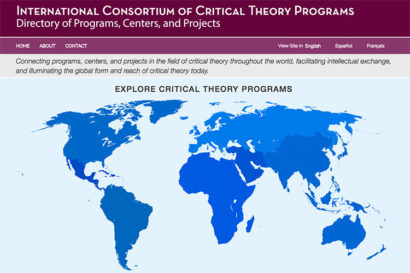International critical theory consortium launches with Mellon Foundation help
Among the international consortium's tasks are exploring the role of 21st-century populism, a contemporary critique of violence, and assessing the global university.
February 2, 2017
An International Consortium of Critical Theory Programs based at the UC Berkeley’s Consortium for Interdisciplinary Research will document, connect and promote new forms of critical theory that seek to respond to complex contemporary challenges across the globe.
 The consortium, a special project of the Program in Critical Theory, is made possible by a $1.5 million, three-and-a half-year grant from the Andrew W. Mellon Foundation. A smaller Mellon exploratory grant in 2015 financed initial planning efforts that took place in Buenos Aires, Cape Town and Athens.
The consortium, a special project of the Program in Critical Theory, is made possible by a $1.5 million, three-and-a half-year grant from the Andrew W. Mellon Foundation. A smaller Mellon exploratory grant in 2015 financed initial planning efforts that took place in Buenos Aires, Cape Town and Athens.
Judith Butler, UC Berkeley’s Maxine Elliot Professor in the Department of Comparative Literature and co-founder of Berkeley’s Program in Critical Theory, as well as the consortium’s principal investigator, announced the latest grant today.
Critical tasks of the university
“This will allow us to open new institutional links and to pursue collaborative forms of interdisciplinary knowledge on topics such as the role of populism in relation to democracy and authoritarianism, a contemporary critique of violence, and the critical tasks of the global university,” Butler said.
Consortium scholars, she said, also are particularly interested in supporting forms of knowledge whose value is not always measurable by quantitative means and those that allow academics to respond to common concerns in the global arena.
The consortium website for a field largely European in origin already boasts an international directory of more than 300 critical theory programs, centers, institutes, projects, summer programs, fellowships and archives in the Global South, the United States, Europe and its peripheries, the Balkans, the Middle East, Russia and East Asia.
The online network has begun to establish global connections among critical theory programs and plans to link projects, providing ways to expand collaborative partnerships for the purposes of documenting and furthering the global shape and reach of the field.
The primary objectives of the consortium include:
- Maintaining and expanding a website, criticaltheoryconsortium.org, that currently consists of an interactive map and international directory to provide common platforms to share information and facilitate exchanges and collaborations within a global frame.
- Publishing a peer-reviewed, online journal to be called Critical Times: Interventions in Global Critical Theory several times a year. It will be supervised by scholars at UC Berkeley and Johns Hopkins University in Baltimore.
- Establishing a book series, Critical South, with Polity Press in the United Kingdom that will translate the works of established scholars whose work has not been properly recognized and commission new works on issues of global concern that stimulate cross-hemispheric discussion.
- Convening seven conferences on critical theory in conjunction with affiliates from around the globe and including UC Berkeley faculty.
- Turning UC Irvine’s Critical Theory Archive – the most significant archive of its kind in the United States – into a digital portal for researchers that more fully reflects the international scope of the academic field.
- Facilitating visits by international scholars in conjunction with UC Berkeley’s Program in Critical Theory.
The university and critical theory
The project underscores the importance of the university in safeguarding and furthering interdisciplinary critical thought, a chance to make the most of convergent research across the humanities and the social sciences, but also the arts and sciences more broadly, that seeks to respond thoughtfully to some of the major challenges of our times, Butler said.
Berkeley’s Program in Critical Theory is one of its largest designated emphases. It serves more than 90 graduate students enrolled in established Ph.D. programs across the social sciences, arts and humanities.
“UC Berkeley has a long tradition valuing critical thought and its contributions to public life,” said Anthony Cascardi, Irving and Jean Stone dean of arts and humanities. “The international consortium will allow us to better understand the various forms critical theory has assumed across the globe, build networks to foster it, and demonstrate the key role it has both inside the academy and to public life.”